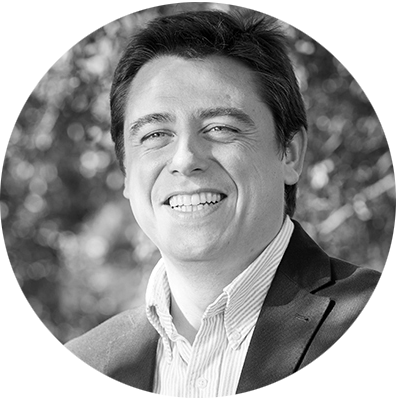Married and father of seven children whom he considers "his best investment", Borja Barragán has been working in investment banking for 19 years. Multinationals such as Bank of America Merrill Lynch, Royal Bank of Scotland, Goldman Sachs and Julius Baer are on his resume.

He has furthered his education in Business Administration and Management (ICADE) at Harvard University (Boston) in the Sustainable Finance & Investments Program; he has also completed a Master's degree in Family Pastoral Care at the John Paul II Institute; he has studied the Social Doctrine of the Church at the Angelicum (Rome); and he has studied in depth the management of endowments and institutional funds at IESE Business School.
In 2017 he founded Altum Faithful Investing, a financial advisory firm that follows the criteria of the magisterium of the Catholic Church in each and every one of its decisions. He tries to ensure that, as he says, a Christian does not have to choose between the profitability of his assets and living his faith to the full.
Why are we afraid to talk about money and relate it to God and our faith in His love?
- I believe that this is due to two reasons: on the one hand, we live too attached to material goods. Our security is based more and more on the things we possess, leaving less and less room for trust in God. Providing for the future, for our children, for when "bad things come" is a symptom of proper administration, but when all trust is placed in "having", that is where God has no place and it is uncomfortable to be able to relate the material with God.
On the other hand, today's society separates the transcendental from the ordinary and money tends to be considered as something tremendously "ordinary" and far removed from the spiritual. However... does this separation make sense? If for the Catholic "everything is a gift" and that gift comes from God, in the face of the gift received (whether it is a material or spiritual gift) the task of administering it correctly arises. Not by imposition, but by reciprocity, by wanting to correspond to the love received through gifts, also with love, through a responsible and coherent administration.
Is it Christian to save, when so many people are in need? Wouldn't it be better to trust in providence?
- I recognize that St. Thomas Aquinas is one of the authors who challenge me the most. In the Summa Theologica he says the following about Providence: "God has ordained certain things according to his Providence for the bodily sustenance of man", so that "goods are subject to man, so that he may use them in order to meet his needs".
Therefore, we start from a clear premise, which is that man needs material goods to cover his present and future needs, hence providing for the future by saving seems not to be a conflict for the Christian.
Discernment (and here comes into play the freedom of each person to decide what is appropriate for each moment) comes into play at the moment when it is necessary to decide between what is necessary and what is superfluous. If the act of saving, of providing for the future, is orderly, according to the state and condition of each person, it should not pose any problem.
If, on the contrary, it is disorderly in the sense that this saving becomes obsessive, hoarding, seeking to prevent all possible eventualities, leaving Providence aside, then perhaps it is convenient to review this way of saving.
Can the Church invest money with so many pressing needs in the world?
- As we mentioned before, investing in an orderly manner is perfectly licit for any entity, be it the Church or a family. In the specific case of the Church, what we said about the superfluous takes on greater relevance. If the Church invests, it is not to hoard or to appropriate goods, but so that these goods may bear fruit and that this fruit may be used in favor of the needs of others.
I believe that it is beyond any doubt that the investment that the Church can make will always seek a perfect balance between the two aspects inherent to saving. On the one hand, to have assets to cover what is necessary to sustain its own sustenance (let us not forget that without this there would be nothing - neither for the Church, nor for the needs of worship, pastoral and other needs) and on the other hand, to combine covering the needs of the Church and the needs of others. what is necessary with help with the superfluous to satisfy the needs of the other.
I think a good practical exercise would be to visit the web site of transparency of the Episcopal Conference to understand how the money is used and the balance that is achieved for the support of the diocesan church itself, while at the same time attending to all kinds of pastoral and welfare activities.
Are investments a good way to save?
- Assets are not good in themselves, they are good because of the good that can be achieved with them. Earmarking a portion of savings that will not be needed in the short term to generate a return is part of the objective of preserving capital to meet future needs; it is a healthy exercise and part of responsible management.
In fact, it is an exercise that obviously applies not only to a mother managing her household savings, but even the Congregation for Institutes of Consecrated Life and Societies of Apostolic Life (CIVCSVA) has resurrected a term used in canon law which is the concept of stable patrimony. In a very summarized form, this stable patrimony would be the minimum patrimony that a religious institute would need to guarantee and sustain its charism and mission.
The latest indications of the CIVCSVA contemplate the possibility that part of this wealth can be invested (either in movable assets or real estate) not only as a way of saving (providing for the future) but also as a correct way of managing this stable wealth.
Are investments for the rich?
- Technology today allows anyone, from anywhere in the world to invest. The question is whether I want my investment to be consistent with my faith or hide my head in the sand to avoid uncomfortable questions.
From Altum we wanted to do our bit by creating Altum App. It is a free application where the user, regardless of their wealth, can check before investing (or consuming) if the companies they are interested in are in conflict with the Social Doctrine of the Church and for what reason.
The first is to highlight the fact that the Faithful Investing is for everyone, regardless of one's savings.
The second is to help anyone with a Christian sensibility to be able to unite faith and coherence when investing (and consuming).
The last one is to encourage managers and CEOs to know how to respond and adapt their business policies so that the dignity of the person (the basis of the Social Doctrine of the Church) is always respected and that in no case should the end justify the means.
Are there good and bad investments or are they all the same?
- I answer the question with the understanding that as "good" we emphasize the search for the good and not for high profitability. St. John Paul II said it very clearly in Centessimus Annus: "The choice to invest in one place and not in another is always a moral and cultural choice". If in life there are good acts (helping the sick), bad acts (killing the innocent) and neutral acts (humming a song), the same is true for the concrete act of investing.
It is curious that for some aspects of our lives we go to a lot of trouble to find out how we spend our money (for example, analyzing whether the eggs we buy in the supermarket are free-range eggs or whether the nuts are organic) and that for the act of investing we hardly stop to think whether the activity carried out by a company is lawful or whether the philanthropic practices developed by the company conflict with the Social Doctrine of the Church (it is impressive how many entities consistently support abortion, to cite just one example).
Altum's raison d'être is precisely that: to accompany the Christian investor so that he does not have to choose between integrity and an adequate return.
Do we influence the world's big companies? Does money rule or do people rule?
- I have no doubt: people are the ones who are really capable of influencing and changing the world. But this is not easy because it usually involves swimming against the current.
Benedict XVI often made allusion to the creative minorities, that is, small groups of people who are capable of generating a cultural change, in many cases against the masses. Several examples: nowadays, a handful of tweets can cause a listed company to withdraw an advertising campaign.
The Little Sisters of the Poor in the USA have won Supreme Court recognition of their conscientious objection to performing abortions or providing contraceptives in their hospitals. A consortium of American congregations joined together 50 years ago to influence the decisions of the companies in which they were invested - today they influence more than $4 billion.
Therefore, I reiterate my previous statement: it is people who influence the world. Money is only a means and not an end. It is up to us not to make a pact with the established order and to have the courage to broaden our horizons. In our specific case, to be able to make an investment that is consistent with faith in Christ.











